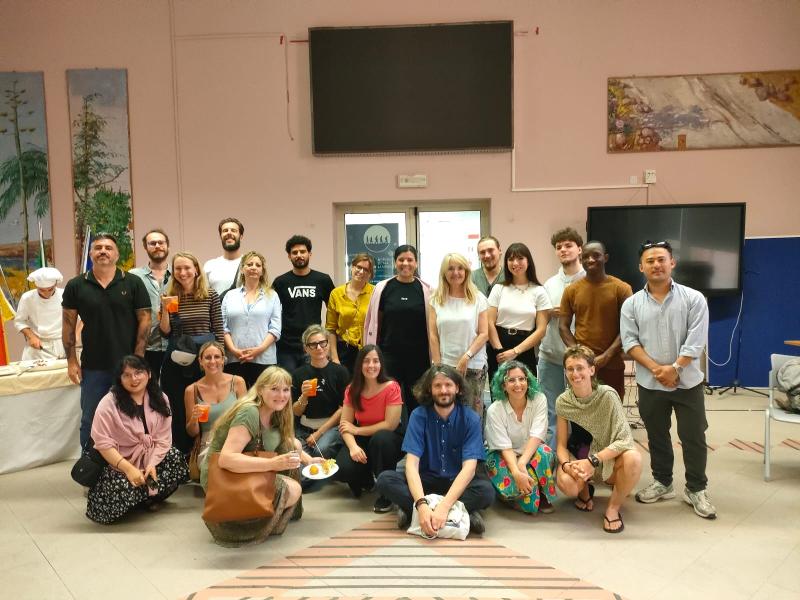Lampedusa re-imagined: students redefine the future of Europe from its margins
Through storytelling, memory, and collective visioning, the youth of Lampedusa transform their island into a powerful symbol of resistance, dignity, and hope during the Italian stage of the European project Ways of Europe.

The Italian stage of the European project Ways of Europe has just concluded in Lampedusa. Coordinated by Arci Solidarietà in collaboration with Mandragola Editrice and a network of European partners, the two-day event focused on the screening of a short film created by students of the “Ettore Majorana” Scientific High School. The video is the outcome of a participatory workshop held in May with first and second-year students. Using the Finnish “Future dialogues” methodology, the students imagined a 2027 Lampedusa in which deaths at sea have drastically decreased and the migration emergency is on its way to resolution. Starting from this hopeful vision, they collectively reflected on the political decisions, social choices, and individual responsibilities that could make that future possible. The result is an intense and collective piece of work that portrays Lampedusa not just as a border or a landing point, but as a home, a wound, and a possibility. An island lived daily between isolation, the desire to leave, and the pride of staying, where young people claim the right to dream and to matter.
The two-day event opened on Tuesday, June 3 at the IBBY Children’s Library with a discussion on active solidarity and art as a tool for transformation. Among the speakers were Tanja Boukal, a Viennese artist currently in residence on the island for a year as part of the RiparAbile Festival, promoted by Agrigento 2025 – Italian Capital of Culture, and Francesca Saccomandi, a representative of the Mediterranean Hope programme, active in Lampedusa since 2014. This observatory works on first reception, mediation, and collecting data and personal stories. In the afternoon, the school’s Aula Magna hosted the project’s plenary session, which included a presentation of the workshop results, an open discussion with partners, and the co-creation of a draft manifesto on Europe’s future, followed by an aperitif offered by students of the local hospitality school.
The morning of June 4 was dedicated to the public screening of the short film, attended by local residents, the school community, and international delegates. Among the guest speakers was Cecilia Ferrara, journalist for ANSA and co-author, with Angela Gennaro, of the book “Perdersi in Europa senza famiglia. Storie di minori migranti” (“Getting Lost in Europe Without Family: Stories of Migrant Minors”). She engaged in dialogue with the students about unaccompanied foreign minors and human trafficking. Khaled Abdallah, a Palestinian refugee and current operator with Arci Solidarietà Roma, also spoke, sharing his personal story and delivering a powerful message of resistance and hope. The session also featured Hungarian filmmaker Philip Pollák, who presented the trailer for his documentary Anachoma — an investigative work that denounces illegal pushback practices on the Greek-Turkish border through the testimonies of three young Pakistani men who survived violence and abuse in the Aegean Sea.
In the afternoon, participants embarked on a symbolic pilgrimage to the Porta d’Europa, a monument by Mimmo Paladino located at the southernmost point of the continent, dedicated to the victims of Mediterranean shipwrecks. They then visited the island’s cemetery with lawyer and activist Paola La Rosa, who has long worked to restore identity and dignity to migrants buried without a name. The journey continued with a visit to the Archivio Storico di Lampedusa, an independent cultural centre that collects documents and testimonies about the island’s history and community life. The day ended with an evening at Porto M, a social and cultural space created by the association I figli di Abele, which promotes youth workshops, artistic events, and inclusive community activities.
The Lampedusa event is part of a two-year journey that crosses several symbolic migration sites in Europe – from Calais to Budapest, from Barcelona to Lampedusa – to gather voices and visions from those living the border every day. Funded by the European Commission through the CERV programme, Ways of Europe aims to overturn the emergency-focused, top-down narrative of migration, restoring protagonism to marginalised communities, local territories, and younger generations. From Lampedusa – a frontier island and laboratory of the future – comes a clear message: building a fairer Europe starts at its edges, by listening to those who live and imagine it every day.


